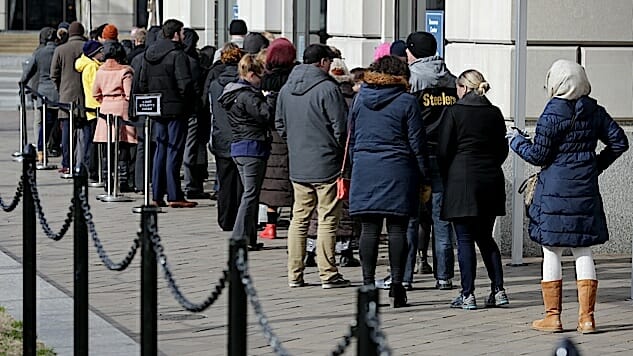Will the Government Shutdown Drive Federal Workers to Vote Against Trump in 2020?
Photo by Chip Somodevilla/Getty
At a time when hypocrisy and illogical reasoning seem to reign supreme within a government torn in two over what is ultimately a really expensive construction/vanity project, it would seem as though we’ve already maxed out our tolerance for the inane. But the recent government shutdown—which earned the dubious honor of being the longest shutdown in U.S. history at a whopping 35 days—proved to be fertile ground for sprouting even more frustration, with 800,000 federal workers waiting on suspended paychecks, caught in limbo as the Washington elite bickered amongst themselves.
Last week, said Washington elite made a show of feigned progress by voting on two separate proposals that were essentially dead on arrival: one, backed by Trump, included $5.7 billion for his beloved wall while extending protections to some undocumented immigrants; the other, backed by Democrats, would reopen the government for two weeks in hopes of reaching a compromise within that time frame. The latter proposal would, naturally, not offer any money toward Trump’s wall. Thankfully, by Friday, Trump felt enough of the heat to agree to reopen the government for at least three weeks, knowing full well that another government shutdown is “certainly an option.” His voter base—and the vast majority of Americans—are less than impressed.
Meanwhile, Trump’s mercurial decision-making cost the U.S. government an estimated $3 million, according to Reuters. And those 800,000 federal workers who were scraping to get by, turning to the gig economy to make ends meet—driving for Lyft or Uber and listing their homes on AirBnB—won’t soon forget the hardships that Trump and the shutdown put them through. (One unsubstantiated rumor on Reddit even claimed that federal employees were turning to Silicon Valley sludge Soylent as a way to get nutrients on a budget). Many who were furloughed were looking into other permanent or temporary jobs, and those who were still working without pay grew increasingly angry as they were expected to operate as though things were business as usual, but with even fewer resources, support, and motivation. The pains were felt across all industries.
“It feels like we’re on the front lines trying to fight a battle while our own forces are shooting us in the back,” Chief Judge Ruben Castillo of Illinois told NPR. With the government shutdown, courts were short-staffed and were therefore contemplating drastic measures just to continue operating, like halting all civil cases, including civil rights cases against police and work discrimination/sexual harassment cases. “That’s basically the sad story,” Castillo said. “There is a price that this country is going to pay that far surpasses anything anyone realizes.”
Workers who punch the clock for the FDA, the EPA, the TSA, and even the U.S. Border Patrol and Customs felt the strains as well. “The prospect that for no reason at all, I may have to find another permanent job is very frustrating, and it speaks to a kind of waste,” one worker said in a New York Times-produced video highlighting the hardships workers were going through during the shutdown. “You know, the taxpayers are going to have to fund the whole hiring process for my replacement.”
The U.S. Coast Guard, too, was hit by the shutdown, with more than 40,000 active duty members and 8,000 civilian employees going without their paychecks for upwards of a month. If the government hadn’t re-opened before Feb. 1, approximately 50,000 retirees, survivors and other beneficiaries would have also gone without the benefits that they depend upon for medication and services. It would have been the first time this happened in the history of the Coast Guard’s existence, dating back to its founding in 1790.
“I find it unacceptable that Coast Guard men and women have to rely on food pantries and donations to get through day-to-day life as service members,” head of the Guard, Adm. Karl Schultz, said in a message to Coast Guard members via Twitter last Tuesday. “You, as members of the armed services, should not be expected to shoulder this burden.”
-

-

-

-

-

-

-

-

-

-

-

-

-

-

-

-

-

-

-

-

-

-

-

-

-

-

-

-

-

-

-

-

-

-

-

-

-

-

-

-








































